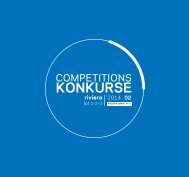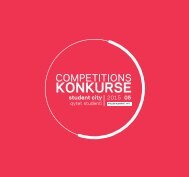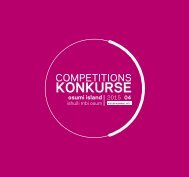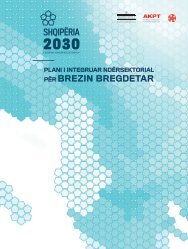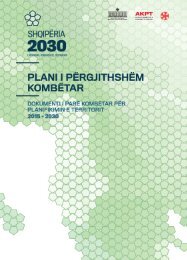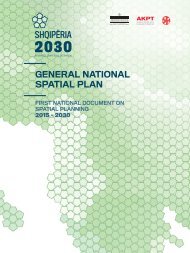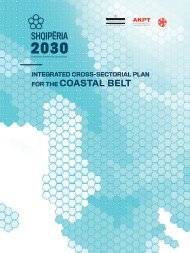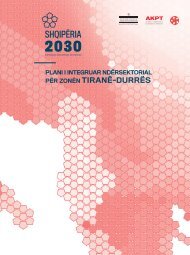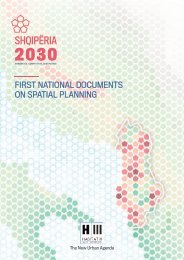Integrated Cross-Sectorial Plan of Tirana-Durres Area
The Albanian Government and the National Spatial Plan have identified the Tiranë-Durrës area, as one of the most important economic areas of the country, and of the Balkan region. To ensure a sustainable territorial and urban development of this area, the Ministry of Urban Development in cooperation with the National Territorial Planning Agency has taken the initiative to draft a Cross-sectoral Integrated Plan for the economic area Tiranë – Durrës. The metropolitan region under study includes territories administered by 5 municipalities: Tiranë, Durrës, Vorë, Shijak, Kamëz.
The Albanian Government and the National Spatial Plan have identified the Tiranë-Durrës area, as one of the most important economic areas of the country, and of the Balkan region. To ensure a sustainable territorial and urban development of this area, the Ministry of Urban Development in cooperation with the National Territorial Planning Agency has taken the initiative to draft a Cross-sectoral Integrated Plan for the economic area Tiranë – Durrës. The metropolitan region under study includes territories administered by 5 municipalities: Tiranë, Durrës, Vorë, Shijak, Kamëz.
Create successful ePaper yourself
Turn your PDF publications into a flip-book with our unique Google optimized e-Paper software.
• The expansion <strong>of</strong> the network <strong>of</strong><br />
partnerships and collaborative alliances in<br />
services and branded products, based on<br />
innovation and knowledge.<br />
• The development <strong>of</strong> human capacities in<br />
local public institutions through incubators,<br />
vocational schools and specific courses<br />
directed at industrial processes <strong>of</strong> products,<br />
logistics and global sales network.<br />
• The establishment <strong>of</strong> platforms and support<br />
structures to supply the chain with regional<br />
quality raw products that contribute to the<br />
creation <strong>of</strong> authentic agricultural brands.<br />
Additional opportunities for the agroindustry<br />
sector will be carried out by:<br />
• Establishing storage structures, collection,<br />
processing and trading centres at regional<br />
and local level. The Regional Development<br />
Agency, the municipalities <strong>of</strong> the region and<br />
the line ministry should define the hierarchy<br />
and priority areas to build these structures<br />
that will be created by private entrepreneurs.<br />
• Creating supportive conditions to diversify<br />
the range <strong>of</strong> products, which are developed<br />
through the promotion <strong>of</strong> cooperation<br />
schemes among new entrepreneurs in urban<br />
areas and local farmers. These activities,<br />
aimed at promoting cooperation between<br />
urban and rural centres, are suggested to be<br />
developed in peri-urban areas.<br />
• Establishing laboratory and certification<br />
structures to increase product standards will<br />
enable product access at an international<br />
level. The establishment <strong>of</strong> municipal<br />
structures for the management and<br />
monitoring <strong>of</strong> these standards will create the<br />
conditions to establish a full chain in regional<br />
agro-industry products.<br />
• Agro-incubators are very much needed<br />
to help young entrepreneurs to establish<br />
not only the survival conditions in the early<br />
years, but also the networking opportunities<br />
in the global network. Agro-incubators<br />
should create the conditions to promote<br />
free entrepreneurship with a focus on “Bio”<br />
agriculture, by supporting stakeholders<br />
with the necessary knowledge and s<strong>of</strong>t loan<br />
schemes.<br />
The plan proposes to establish 2<br />
agro-incubators in Kamza and Shijak<br />
municipalities.<br />
Achieving the quality <strong>of</strong> ‘bio’ products in the<br />
regional food chain should be supported by:<br />
• Prohibiting discharges <strong>of</strong> untreated urban<br />
waters into rivers (Erzen and Ishem) and<br />
irrigation channels. The municipalities <strong>of</strong><br />
the region should complete the construction<br />
<strong>of</strong> the respective infrastructure for urbanrural<br />
centres and create the conditions,<br />
norms and standards for the construction <strong>of</strong><br />
managed septic tanks, for grouped or isolated<br />
dwellings far from urban areas. (Local<br />
monitoring structures should develop cyclical<br />
system controls to analyze the quality <strong>of</strong> the<br />
regional environment, the latter being one <strong>of</strong><br />
the key factors affecting product certification<br />
oriented toward exports).<br />
• Developing integrated and protected<br />
irrigation and drainage systems starting<br />
from: the reservoir pumping system, cleaning<br />
<strong>of</strong> remaining active reservoirs, cleaning<br />
<strong>of</strong> discharge outlets, irrigation / drainage<br />
channels and their centralized control<br />
systems, construction <strong>of</strong> controlled and<br />
certified water wells.<br />
• Developing networks and hubs in regional<br />
municipalities for the recycling and<br />
composting <strong>of</strong> natural waste as well as their<br />
reuse for a sustainable circular economy. The<br />
strategic poles to develop these structures<br />
are:<br />
Shijak-Sukth; Qerret-Hamallaj;<br />
Ndroq-Peze;<br />
Vore-Berxulle-Bubq;<br />
Farke-Petrele-Mullet-Arbane;<br />
Valias-Nikel.<br />
140




